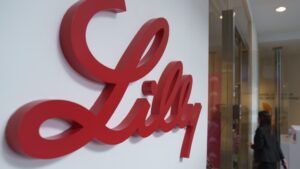Eli Lilly Sees Mixed Results Amid Surge in Diabetes and Weight Loss Drug Demand
Eli Lilly & Co. is making headlines as it navigates the complex landscape of the pharmaceutical industry, recently reporting first-quarter results that both exceeded expectations and hinted at future challenges. With revenue and earnings propelled by soaring demand for its diabetes and weight loss medications, the company’s outlook has shifted, prompting adjustments in its profit guidance.
Strong Financial Performance with a Cautionary Note
On Thursday, Eli Lilly announced impressive first-quarter earnings, with adjusted earnings per share of $3.34, up from the anticipated $3.02, and revenue of $12.73 billion, slightly surpassing the expected $12.67 billion. This marks a remarkable 45% increase in revenue year-over-year, showcasing the company’s robust growth trajectory.
However, investors were taken aback as Eli Lilly revised its full-year profit forecast downward. The new projection for adjusted fiscal 2025 earnings is between $20.78 and $22.28 per share, down from the previous range of $22.50 to $24 per share. This revision comes in light of a substantial $1.57 billion charge related to the acquisition of a promising oral cancer drug from Scorpion Therapeutics.
Game-Changing Products on the Rise
Eli Lilly’s diabetes treatment, Mounjaro, posted revenues of $3.84 billion for the quarter, representing an astonishing 113% rise from the same period last year. The company’s newer weight loss drug, Zepbound, also outperformed expectations, generating $2.31 billion, a figure that more than quadrupled its debut earnings of $517.4 million. Analysts had projected Mounjaro’s sales at $3.81 billion and Zepbound’s at $2.28 billion, reflecting the strong consumer demand for these innovative treatments.
Regulatory Insights and Market Dynamics
Yet, it wasn’t all smooth sailing; shares of Eli Lilly fell over 9% following CVS Health’s decision to prefer Novo Nordisk’s Wegovy over Zepbound in its primary formularies. This move underscores the intense competition within the weight loss segment, as both companies strive to claim a larger share of a lucrative market.
Beyond the Numbers: Industry Perspectives
In an insightful interview with CNBC, Eli Lilly’s CEO, Dave Ricks, highlighted the systemic changes brought about by the current administration’s tariff policies. Ricks emphasized that the existing tariffs are already incentivizing U.S. manufacturing for critical supplies, including pharmaceuticals. "The threat of tariffs might actually be beneficial in bringing back essential supply chains," he remarked, suggesting that lowered tax rates—particularly a proposed 15% for domestic production—could encourage drugmakers to repatriate manufacturing from low-tax locations like Ireland and Singapore.
Looking Ahead: Supply, Demand, and Manufacturing Challenges
Even as Eli Lilly enjoys a period of growth, challenges loom on the horizon. The U.S. market’s demand for Mounjaro and Zepbound continues to outstrip supply, which has compelled both Eli Lilly and its competitors to invest significantly in scaling up production capabilities. The FDA’s recent proclamation regarding the resolution of the U.S. shortage of tirzepatide—the active ingredient in both drugs—was a significant development. This ruling will help eliminate competition from unregulated compounding pharmacies, thus stabilizing the market further.
Conclusion: Why Follow Eli Lilly at Extreme Investor Network?
At the Extreme Investor Network, we are committed to bringing you the latest and most insightful analysis of financial news. As Eli Lilly continues to navigate both opportunities and uncertainties in the pharmaceutical sector, staying updated on their strategic movements is crucial for investors. With the potential for groundbreaking treatments and a shifting regulatory landscape, Eli Lilly remains a critical player to watch.
Join us as we delve deeper into the world of investment opportunities and provide you with the insights and analyses that you won’t find elsewhere!

